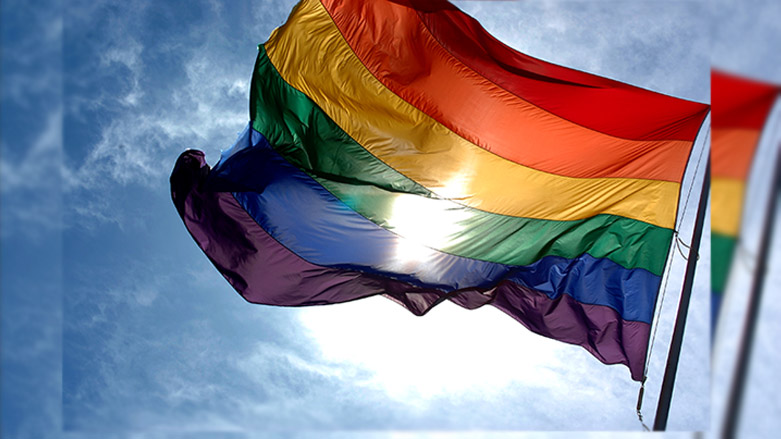Iraq condemns foreign embassies for violating country’s ‘values’ by displaying rainbow flag
The Iraqi foreign ministry condemned foreign embassies on Sunday for offending what it called the country’s “norms and values” by hoisting the rainbow flag, also termed the LGBTQ or gay pride flag, on the International Day Against Homophobia, Transphobia, and Biphobia.

ERBIL (Kurdistan 24) – The Iraqi foreign ministry condemned foreign embassies on Sunday for offending what it called the country’s “norms and values” by hoisting the rainbow flag, also termed the LGBTQ or gay pride flag, on the International Day Against Homophobia, Transphobia, and Biphobia.
Before the ministry announcement, many Iraqi officials and politicians made calls for the removal of the pride flag raised by the mission offices of the UK, the European Union, Canada, and the World Bank office in Baghdad to highlight the rights of LGBTQ individuals. One lawmaker even demanded the closure of the EU embassy.
Sunday social media posts by the British and EU embassies marking the occasion have since been removed.
The Iraqi foreign ministry claimed in a statement that the move is a “violation of the high moral principles and values respected by all divine religions” and goes against the “sacred religious feelings” of Iraqis. The nation is majority Shia Muslim.
It should be noted that religious communities, notably the Abrahamic faiths of Christianity and Judaism, have become more accepting of sexual and gender minorities in recent decades. Many European and North American countries—which are majority Christian—and Israel—predominantly Jewish—have enacted laws protecting them from discrimination and hate crimes.
Even among Muslims, especially the younger generations and those part of the European and American diaspora, there is a growing positive, or at least permissive, view of and attitude toward these historically, and still to this day, oppressed communities.
Iraqi LGBTQ activists long been part of campaigns to raise awareness about these groups in the country, slowly growing after the fall of the former regime of Saddam Hussein in 2003 to a US-led military campaign.
As the voice of these activists grew, however, influential figures upped their calls for violence against LGBTQ Iraqis, who have also been a part of the anti-government protests that began in late 2019 and calling for systemic change. Official reports indicate that Iraqi forces have killed upwards of 600 demonstrators and wounded over 20,000 others.
A largely conservative society, individuals who were, or suspected of being, part of the LGBTQ community have been targeted for their presumed identities, including one particularly gruesome incident in late 2018.
Related Article: Video said to show Baghdad teen dying while filmer makes anti-gay taunts
Human Rights Watch has extensively documented kidnappings, torture, and executions of such minorities by different militia groups, including one taking its orders from firebrand cleric Muqtada al-Sadr, with impunity.
Clerical Scapegoating
In his Sunday statement on the hoisting of the flag, Sadr—the chief of the largest faction in the Iraqi parliament—referred to LGBTQ people as “mentally ill needing treatment and guidance.” He also said he expected the Iraqi government and parliament to respond to the embassies raising the flag.
In late March, the self-styled nationalist cleric joined a host of unqualified figures to theorize the origins of the new coronavirus disease. He blamed it on one of his usual scapegoats, claiming that same-sex marriage was among the “causes” of the global pandemic.
Another influential politician and cleric, Ammar Hakim, was among a series of officials who spoke out against the hoisting of the flag. Deputy parliamentary speaker Bashir Haddad, the Religious Affairs Committee, and a number of other factions in the legislature issued similar remarks.
The Dawa Party of former Iraqi prime minister Nouri al-Maliki said the move to raise the rainbow flag in the capital was especially offensive during the holy month of Ramadan, while Iraqis are “closer to God.”
Few other issues, including the daily killings of protesters on the streets of Iraq, appear to have caused such a speedy chorus of condemnatory statements from so many government bodies and top officials across ethnic and sectarian lines.
Editing by John J. Catherine